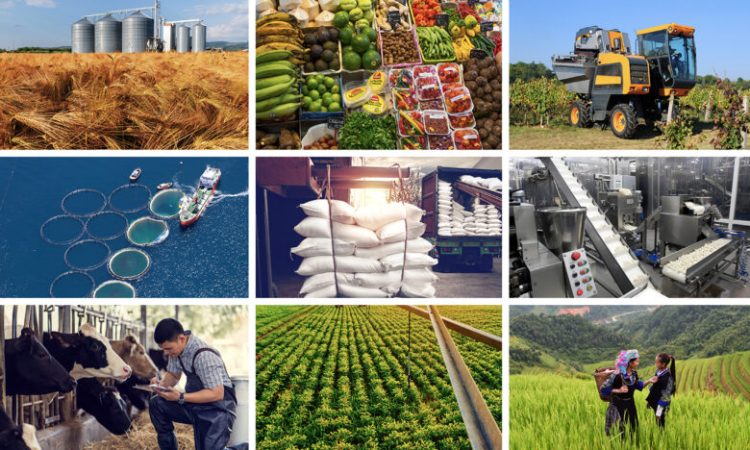Nestle Nigeria Dealing With Threats To Agriculture For A Sustainable Food System

EDET UDOH
Stakeholders in the Agriculture value chain globally are concerned about the challenges facing the future of agriculture and its negative effect on food security. They emphasize the need to address the issue to guarantee a sustainable food system for the global population now and in the future.
Oxford Languages Dictionary defines Agriculture as the science or practice of farming, including cultivation of the soil for the growing of crops and the rearing of animals to provide food, wool, and other products.
Agriculture is vital to the global economy, contributing significantly to Gross Domestic Product (GDP), employment, and food security, while also impacting trade and economic development, especially in developing countries.
To address this situation, experts listed some of the critical issues that must be addressed to ensure food security – poverty; sustainable food and agricultural systems; economic growth and population dynamics; climate Change and Weather Extremes; Soil Degradation and Erosion; Pest and Disease Outbreaks; Access to Resources; Marketing and Value Chains; Policy and Regulatory Frameworks; Conflicts, crises and natural disasters and Labor Shortages and adoption of sustainable agriculture practice.
Experts believe that addressing these issues will lead to increased farmland, access to resources, better soil for enhanced agricultural production, increased profitability, and encourage increased participation in agriculture.
In this article, the writer highlights the challenges agriculture is facing and its attendant effect on food security and economic stability; how to deal with the challenges and what Nestle Nigeria is doing to boost agriculture and promote sustainable farming practices to enhance food security.
According to the World Bank’s latest food security report, food security continues to be at alarming levels in most low-income countries, particularly in Africa. An estimated 61.6 million people are food insecure in East Africa, and nearly 50 million people are projected to face food insecurity in Western and Central Africa. Conflicts and climate change continue to be the main drivers of food insecurity.
“Domestic food price inflation remains high in many low-income countries. Information from the latest month data – October 2024 and January 2025 shows that inflation higher than 5% is experienced in 73.7% of low-income countries (1.5% higher since the last update on January 14, 2025), 52.2% of lower-middle-income countries (8.7 % higher), 38% of upper-middle-income countries (no change), and 5.6% of high-income countries (1.8 % lower). In real terms, food price inflation exceeded overall inflation in 56% of the 164 countries where data is available,” the report stated. (https://www.worldbank.org/en/topic/agriculture/brief/food-security-update)
In its recent article “The Future of Food and Agriculture: Trends and Challenges,” the Food and Agricultural Organisation of the United Nations (FAO) noted the progress so far made in reducing hunger and poverty and improving food security and nutrition as well as how gains in productivity and technological advancement have contributed to more efficient resource use and improved food safety.
Conversely, the article also pointed to areas of concern – Some 795 million people still suffer from hunger, and more than two billion from micronutrient deficiencies or forms of overnourishment. It also noted that global food security could be in jeopardy, due to mounting pressures on natural resources and climate change, both of which threaten the sustainability of food systems at large. Planetary boundaries may well be surpassed if current trends continue.
FAO believes that the key challenges that need to be addressed to succeed in eradicating hunger and poverty, while making agriculture and food systems sustainable include the uneven demographic expansion that will take place in the coming decades, the threats posed by climate change, the intensification of natural disasters and upsurges in transboundary pests and diseases, and the need to adjust to major changes taking place in global food systems. (https://openknowledge.fao.org/server/api/core/bitstreams/2e90c833-8e84-46f2-a675-ea2d7afa4e24/content)
Findings show that in recent research on “What is the biggest challenge facing the future of agriculture?” conducted at the Colorado State University, the faculties highlighted challenges facing the future of agriculture such as animal disease; diminishing amount and quality of natural resources (land, water, soil, air) for grazing and growing food; poor public perception and understanding of how food is produced; labour shortages and climate change; lack of funding for problem-solving agricultural research; need for maintaining and improving ecosystem services; high cost of land, labour, and lack of access to capital, technology, regulation, intergenerational transfer.
Others are the need to promote the use of sustainable agricultural practices that reduce greenhouse gas emissions and sustain current crop yields; the lack of affordable, qualified workforce in ‘high-touch’ sectors of agriculture, such as fruit and vegetable; need to identify the best ways to adapt agricultural systems to a changing climate; ensuring sustainable use of water resources; challenges for the future of agriculture is empowering people; need to prioritize food systems that meet people’s basic needs, healing relationships with the Earth; need to embrace regenerative farming practices using both traditional knowledge and smart technologies.
According to Raymond Goodrich, Professor in the Department of Microbiology, Immunology and Pathology in the College of Veterinary Medicine and Biomedical Sciences, “I do believe that addressing animal disease threats, both existing and emerging, is a significant item of concern to the future of agriculture. An outbreak that decimates crops and livestock also decimates those who make a living from growing and raising them. It also decimates a public which relies on food for good health, nutrition and the basic support of life functions. The opportunity that I see is in addressing the challenges by finding ways to create and develop concerted efforts to tackle these threats.”
In his contribution, Dr. Ragan Adams, a Veterinary Extension Specialist with the College of Veterinary Medicine and Biomedical Sciences said, “I think the diminishing amount and quality of natural resources (land, water, soil, air) for grazing and growing food is the greatest challenge. Effects of climate change that were once subtle and suspect to most who were not specialists are becoming profoundly obvious. Population growth has exploded, and municipalities throughout the nation are vying with agriculture for precious natural resources by drying up farms for urban water needs, using farmed lands for housing developments, decreasing the available soil and vegetation that can slow the carbon dioxide released into the atmosphere by paving surfaces and removing trees, and degrading air quality by man-made activities….”
Dr. Sarah Raabis, Assistant Professor of livestock medicine and surgery in the Department of Clinical Sciences, said “A significant challenge to the future of agriculture is public perception and understanding of how food is produced. Advertisement money can make it look like animal health and environmental wellness is being considered at a company when that might not be true. There is also very inconsistent messaging about agricultural products in the media and advertising (“all-natural,” “cage-free” and “happy cows”). The definitions of these labels are not consistent and are mostly unregulated.”
“In this time of unprecedented flux post-pandemic, labour shortages and climate change present challenges to agriculture. Prioritizing and protecting the health and safety of workers will enable us to meet these challenges and strengthen the foundation of the food systems — the people who make the production of food and fibre possible. Agricultural businesses have the opportunity to invest in emergency preparedness, heat illness prevention, safety leadership and more to support worker wellbeing and mental health and build resilience among the workforce,” Whitney Pennington, Outreach lead, High Plains Intermountain Center for Agricultural Health and Safety in the College of Veterinary Medicine and Biomedical Sciences
Contributing, Franklyn Garry, Coordinator of integrated livestock management with AgNext, stated “… One of the remarkable features of our post-modern society is that agriculture production has been so successful that most people can choose almost any diet they wish without ever thinking about how the agric system delivered it to them. But complexity breeds fragility, and many challenges are not well understood by the non-agric community. One of the biggest challenges is that funding for problem-solving ag research is a fraction of the funding for human medical research. It leaves us in a difficult place.”
Speaking on the issue, Greg Thoma, Director of Agricultural Modeling and Assessment at AgNext noted, “Our greatest challenge is to sustainably feed the world. Here, sustainable means two things: feeding the growing population until the anticipated plateau around 2050 and maintaining and improving ecosystem services so that all future generations can also feed themselves.”
Contributing, Kim Stackhouse-Lawson, Director of AgNext and Professor of Animal Sciences stated, “The most significant challenges are primarily cost related – the cost of land, labour, access to capital, technology, regulation, intergenerational transfer, etc. – and the greatest opportunity is to meet the growing demand of food in a new way, with greater transparency and more technology, with the intent of redefining the social intrinsic value of agriculture production.”
“The biggest challenge for agriculture is to promote the use of sustainable agricultural practices that reduce greenhouse gas emissions and sustain current crop yields. Using grassland/crop rotations, adding compost and manure, proper timing of fertilizer, winter cover crops, reducing the use of fallow, sustainable grazing practices and using slow-release fertilizer all reduce greenhouse gas emissions and sustain current crop yields. We need to find ways to promote the use of these practices by the farmer/rancher community with economic incentives and other approaches,” William Parton, Professor Emeritus and Senior Research Scientist with the Natural Resource Ecology Laboratory in the Warner College of Natural Resources said.
According to Adrian Card, Extension Food and Agriculture State Specialist, “Farmers and ranchers throughout the United States and in other countries struggle to recruit and retain an affordable, qualified workforce. This is most acute in ‘high-touch’ sectors of agriculture, such as fruit and vegetable production….”
Commenting on the issue, Nathan Mueller, Assistant Professor in the Department of Ecosystem Science and Sustainability and the Department of Soil and Crop Sciences said, “Climate change is, hands down, the biggest challenge and the biggest opportunity for the future of agriculture. Reaching a ‘net zero’ food system will require collaboration and innovation across the globe, given that food systems currently emit about a third of global greenhouse gases. At the same time, agriculture fundamentally depends on climate, so we must identify the best ways to adapt agricultural systems to a changing climate and help farmers manage climate risks.”
Rebecca Hill, Co-director of AgriAbility, Extension Professor in the Regional Economic Development Institute (REDI) and the Department of Agricultural and Resource Economics explained, “The biggest challenge going into the future for agriculture will be around the sustainable use of our water resources. Over the last 50 years, agriculture has made huge strides in this as well as other areas, but continued innovation in this area will need to be made to address the increased demands on our water resources in the years to come.”
Contributing to the subject matter, Deana Namuth-Covert, Director of ag Upskilling Academy, based in the Department of Soil and Crop Sciences stated, “One of the largest challenges for the future of agriculture is empowering people. The challenges we often hear of — drought, pests, producing more food on less land to feed a growing global population and in profitable ways that improve the environment — we have a lot of smart people working on those challenges from scientists to producers to policymakers. What limits us is creating empowering environments in which humans can continue addressing those challenges. People unfamiliar with agriculture may not be aware of all it takes to bring food to their table and might not understand the sustained support and investments needed for humans working in the industry to thrive.” (https://source.colostate.edu/challenges-of-agriculture/)
It is no doubt that a threat to the future of agriculture is also a threat to food security and economic sustainability. Food security remains a key indicator of economic stability and development. According to the 1996 World Food Summit, food security exists when all people have access to sufficient, safe, and nutritious food at all times.
Experts in Africa particularly in Nigeria and Ivory Coast have suggested steps that should be taken to ensure that the continent is well positioned to meet the challenges of food security.
For instance, Sidiki Cissé, Director-General of the National Agency for Rural Development of Côte d’Ivoire, in a recent interview with Oxford Business Group published under the title “Agriculture
in Africa 2021, gave insight on how to deal with threats to agriculture and food security.
“Africa will double its population in 30 years, and food security measures must be implemented at the continental level. Emphasis should be placed on postharvest activities because many issues related to the processing and preservation of certain products have not yet been resolved. We need to look particularly closely at the redistribution of produce. To this end, research is now focused on the quality and productivity potential of certain crops.
“This path needs to be explored further to improve agricultural practices and harvests in Africa. Other aspects that must be discussed include reducing transport costs and commercialising products.
“Food security will be an increasingly challenging issue in the years to come, which is likely to see people seek job opportunities in agriculture. Therefore, we need to incentivise the younger generation to participate in the sector by making agro-industry more attractive. We must also take into account the need to modernise agricultural practices, and this will require adhering to new standards for the production, preservation, pricing and distribution of crops at both a regional and continental level,” he stated.
In Nigeria, recent reports indicate that food insecurity is worsening, with the World Food Programme (WFP) revealing that 25.1 million Nigerians faced severe hunger in the last quarter of 2024.
According to Research by the Cadre Harmonisé, supported by the Federal Government, predicts that this number could rise to 33.1 million due to inflation, climate change, and insecurity.
Speaking on the need to boost agriculture and ensure a sustainable food system, the Director-General of the Premier Agribusiness Academy and the Feed Industry Practitioners Association of Nigeria (FIPAN), Dr. Toromade Olugbenga, offered critical insights into addressing the crisis, stressing the importance of sustainable food production, economic stability, and technological advancements in agriculture.
He identified major challenges in the sector, including climate change, soil degradation, water scarcity, high production costs, and unpredictable market demands.
To counter these threats, he advocated for precision farming, alternative feed sources, renewable energy, and smart agricultural technologies as well as strengthening supply chains, investing in research, and promoting sustainable farming practices to enhance productivity and reduce food waste.
Dr. Olugbenga highlights the need for business strategies that focus on effectiveness and efficiency, ensuring that agribusinesses remain profitable while maintaining environmental and social responsibility.
He also underscored the importance of skill acquisition, stating that without the necessary expertise, even the best-funded agricultural ventures may fail, emphasizing the urgency of strategic planning, investment in innovation, and collaborative efforts to ensure a sustainable food system.
Nestle Nigeria Promoting Agricultural Growth
In Nigeria, Nestlé Nigeria plays a significant role in the future of Nigerian agriculture by supporting farmers, promoting sustainable practices, and investing in the agricultural sector through various impactful initiatives aimed at boosting agriculture and promoting a sustainable food system.
Over the years, the “Good Food, Good Life” Company, has continued to invest in the agricultural sector through various initiatives like the Sorghum and Millet in the Sahel (SMS) Project, the Nestlé Needs YOUth programme Nestlé Nigeria & IFDC/2Scale Project Sorghum & Millet, Feed the Future Nigeria and Nestlé Maize Quality Improvement Partnership (M-QIP), Golden Morn Agripreneurship Programme, and Dairy Demonstration Farm, among others to boost agriculture and strengthen food system.
The Nestle’s Sorghum and Millet in the Sahel (SMS) Project in partnership with IFDC, aims to strengthen the resilience of millet/sorghum farming systems in Northwestern Nigeria, reaching 30,000 farmers in two years.
Nestlé Nigeria & IFDC/2Scale Project Sorghum & Millet initiative empowers smallholder farmers with sustainable farming practices to improve grain quality and productivity.
Feed the Future Nigeria and Nestlé Maize Quality Improvement Partnership (M-QIP) enhanced the quality and safety of maize and soybeans available to Nestlé’s factories, supporting USAID’s goals of revitalizing Nigeria’s agriculture sector.
Nestlé Needs YOUth Programme aims to help 10 million young people globally access economic opportunities by 2030, including providing training and mentorship for young agripreneurs.
Golden Morn Agripreneurship Programme provides training, financial assistance, mentorship, and networking opportunities to young entrepreneurs involved in, or aspiring to venture into agriculture.
Nestle’s investment in the Dairy Demonstration Farm in Paikon Kore Grazing Reserve, aims at empowering pastoralists through training and provision of enabling infrastructure.
In addressing food quality at the farm level, Nestlé, together with its implementing partners, has made a significant impact in the past years, training thousands of sorghum and millet farmers on good agricultural pre-harvest and post-harvest practices. Over 22% of these farmers are women. The farmers testify to a significant increase in income. This change is due to an increase in productivity, improved crop quality and the availability of a ready market, which eliminates the negative influence of middlemen.
Before Nestlé Nigeria & IFDC/2Scale Project Sorghum & Millet’s intervention, the yield per hectare was 0.9 tons. But in the first year of the project in 2015, the yield doubled to 1.3 tons/hct, and reached 1.8 tons/hct in 2017, progressing towards the maximum yield capacity of 2.35 tons/hct of the crop varieties.
Empowering farmers to manage their businesses, is another contributor to the increase in income and the improved negotiating skills of farmer, underscoring impact of the business training and coaching they have received. The coaching sessions have led to farmers becoming much more confident about their position and the quality of their products. For women producers, this has had an especially strong impact. One example of this can be found in Mrs. Hanna Musa, one of the two women in the negotiations team. Before the coaching, she had been too shy to speak up, but the opportunity to participate in the negotiations on Nestlé’s terms of delivery and payment, helped her grow into her leadership role.
Speaking on the drivers of the outcome of Nestlé Nigeria & IFDC/2Scale Project Sorghum & Millet, Mr. Maxwell Olitsa, Project Manager, IFDC said, “We achieved the results in the field by empowering farmers to adopt best practices and new technology. Showing in addition to telling also made a lot of difference. 27 demo plots were established; six of them managed by women, where best farming practices are demonstrated. The demo plots are always accessible to the farming clusters to provide continuous technical support and coaching in the field.”
To ensure crop integrity from farm to factory gate, the project also trains aggregators, pesticide spray providers and input suppliers. This 360-degree approach has significantly reduced post-harvest losses.
While helping to improve the livelihoods of farmers within the project, Nestlé believes that the continued intervention with its partners will result in sustainable supplies of high-quality grains required for its production sites.
“The results we have achieved so far with Nestlé Nigeria & IFDC/2Scale Project Sorghum & Millet is an example of what is possible when we look at the agriculture value chain holistically from the farm to storage, to transportation, and right down to the factory gate and take definite measures to close the gaps,” he concluded.
Over the years, Sustainable Agriculture Initiative (SAIN) has enabled Nestlé to support hundreds of thousands of farmers to introduce more sustainable practices on their farmlands.
However, through SAIN, Nestlé has provided technical and financial support to farmers in its supply chain, boosting the nation’s agricultural sector and the present government’s food security programme.
In conclusion, it has been established that High-input, resource-intensive farming systems, which have caused massive deforestation, water scarcities, soil depletion and high levels of greenhouse gas emissions are threats to the future of agriculture, and cannot deliver sustainable food and agricultural production. Needed are innovative systems that protect and enhance the natural resource base while increasing productivity. Acceptable is a transformative process towards ‘holistic’ approaches, such as agro-ecology, agro-forestry, climate-smart agriculture and conservation agriculture, which also build upon indigenous and traditional knowledge. Technological improvements, along with drastic cuts in economy-wide and agricultural fossil fuel use, would help address climate change and the intensification of natural hazards, which affect all ecosystems and every aspect of human life. Greater international collaboration is needed to prevent emerging transboundary agriculture and food system threats, such as pests and diseases.








